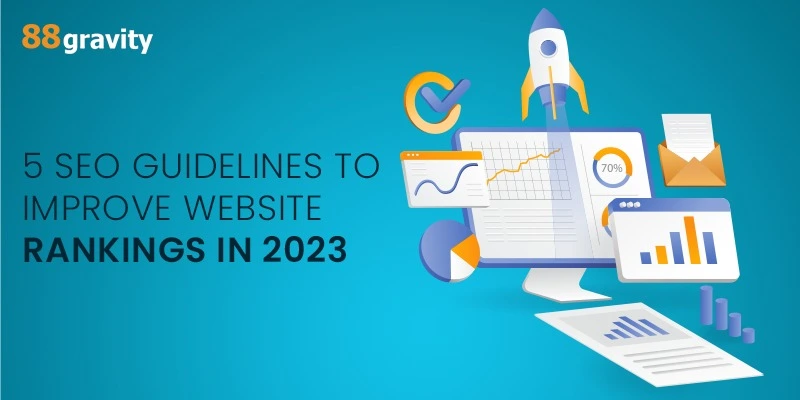
In the ever-modifying world of digital marketing, staying ahead of SEO patterns is vital to maintaining and enhancing your website’s rankings. Here are five top SEO practices that you should be focused on in 2024 for your site to stay competitive and visible on search engine results pages.
5 Best SEO Practices:
You can try a few things to improve your website rankings, here we suggest a few most important practices of them all.
1. Optimize for Core Web Vitals:
One of the biggest updates in recent years has been Google's introduction of Core Web Vitals, a set of metrics designed to gauge user experience. These include:
Largest Contentful Paint (LCP): This measures loading performance. Aim for an LCP of 2.5 seconds or faster.
First Input Delay (FID): This gauges interactivity. A good FID score is less than 100 milliseconds.
Cumulative Layout Shift (CLS): This assesses visual stability. Try to achieve a CLS score of less than 0.1.
2- To optimize for these metrics:
Speed Up Your Site: Compress images, leverage browser caching, and use a content delivery network (CDN).
Improve Interactivity: Minimize JavaScript, remove non-essential third-party scripts, and implement lazy loading for images.
Enhance Visual Stability: Include size attributes for images and videos, avoid inserting content above existing content, and reserve space for ad elements.
Relevance and value: Do a comprehensive keyword search to know what your audience is looking for. Generate content that answers their questions and resolves their complications.
E-A-T (Expertise, Authoritativeness, Trustworthiness): Show your proficiency in the niche you have chosen. Employ reliable sources, gain backlinks from trusted websites, and make sure that facts support your content.
Engaging multimedia: Include videos, infographics, podcasts and other types of media to keep your audience’s attention thus reducing bounce rates. High-quality content not only attracts visitors but also encourages them to stay longer, interact more, and share your material which boosts multiple SEO indicators for you.
3- Mobile Friendliness Improvement:
With most people accessing internet sites using mobile devices today, mobile-friendliness has become a must-have requirement as opposed to being optional. Google’s move towards mobile-first indexing means it primarily uses the mobile version of your site for ranking and indexing.
To improve on mobile-friendliness: Responsive design: Your website should be able to adjust to any screen size. Test it on different devices just to ascertain that it appears correctly everywhere and functions normally.
Mobile performance: Minimize image sizes; enable browser caching; and reduce redirects to speed up the performance of your site on a mobile platform.
4. Implement Advanced On-Page SEO:
Page optimization in the SEO context refers to the practice of altering individual websites so that they can rank higher and draw more relevant traffic. Here are some advanced strategies to consider:
Title Tags and Meta Descriptions: Create compelling, keyword-rich titles and meta descriptions that accurately depict content while enticing users to click.
Header Tags: Use H1 tags for titles and H2, and H3 tags for subtitles to make your content structured well so that it is easily understood by search engines and users alike.
Internal Linking: Direct visitors to related material on your website using internal links. This will help you keep them engaged longer and distribute page authority.
The proper on-page optimization makes search engines understand your content and makes it easy for users to navigate through, as well as find engaging material on your site.
5. Leverage Technical SEO:
Technical SEO entails optimising your website’s crawling and indexing phase thus ensuring that search engines can access, crawl, interpret, or index your site without any hitches.
Site Speed: Constantly check how fast your website is using tools such as Google PageSpeed Insights. Optimise server response time, compress files, and blunt codes where needed.
XML Sitemaps and Robots.txt: Have a current XML sitemap which helps search engines understand how a site is structured. The robots.txt file should be used to determine pages that can be indexed by search engines.
SECURE WEBSITE (HTTPS): Ensure your site is safe by using HTTPS. This does not only help in SEO but also establishes reliability with users.
By concentrating on these features, you will make certain that search engines can crawl and index your website properly to improve its ratings and visibility.
88gravity:
88gravity is one of the best SEO companies in Gurgaon, Haryana. We have the most dedicated and punctual staff that helps us to get to results within time. 88gravity shares the experience and knowledge of best SEO practices to run your business on top. Connect with 88gravity and leave it to us to be on top of your niche.
Adhering to these rules will greatly enhance the SEO of your website, enabling it to be ranked well in search engine results pages and attract the right audience. Always be proactive, keep an eye on how you are doing through Google Analytics or search console, and adapt to the ever-changing landscape of SEO so as to stay ahead of the game. Enjoy optimising!




